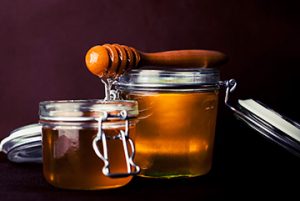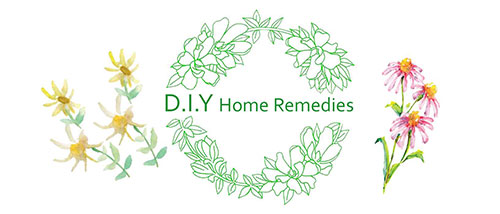 Honey is one of those foods that many of us have in our kitchen cupboard.
Honey is one of those foods that many of us have in our kitchen cupboard.
But, would most likely not think to use it medicinally, but the benefits of honey should never be underestimated!
While it’s most often employed in cooking as a liquid sweetener, it’s useful for several different common illnesses.
Notably in protecting your cardiovascular system, treating coughs, boosting your immune system and when used externally, to help wound healing.
Not All Honey is Created Equal
What’s important to remember is that not all honey is created equal, if you’re looking to use it medicinally it’s important to get honey that has not been heat treated, or in other words, is raw.
Honey is said to contain over 181 natural substances (1) and every honey is unique, taking its taste and aroma from the flower source the bees had access too.
The active constituents of honey (the chemical or chemicals within a plant which are thought to give it its medicinal action) are many.
The main ones are Phenolic compounds, amino acids, antibiotic-rich inhibin, proteins and micronutrients.
Interestingly, darker colours of honey appear to have higher amounts of minerals such as magnesium, potassium, silica and iron (1).
Health Benefits of Honey
Wound Healing
Honey has been used topically as a health and beauty treatment for thousands of years and is still in use today.
Honey is a broad-spectrum anti-biotic and has even been used to treat multi-resistant bacteria (2)
Several studies have shown it to be very effective in helping to clear up skin infections especially post-operatively(4).
Honey is wonderful at drawing out deep infections and objects that have been embedded in the skin such as splinters.
I like to apply a generous amount of honey to the splinter area, cover it with a breathable band-aid and leave it for several hours.
More often than not, the splinter will be at the surface and easily removed after this time.
It is also employed as a beauty product and is used in face masks and face scrubs.
Protect your Cardiovascular System
Honey has a protective effect on your cardiovascular system in several different ways.
The antioxidant effects of honey has been shown to reduce blood pressure. (3)
Daily honey intake can lower cholesterol, particularly the ‘bad cholesterol’ also known as low density lipoprotein and increases your good cholesterol. (6)
Another major risk factor for heart disease is high triglyceride levels. Tryglycerides are a type of fat found in your blood.
Raised levels are associated with an increased risk of heart disease.
Several studies have shown that replacing your daily sugar intake with honey can reduce your blood triglycerides and thus reduce your risk of heart disease. (7,8)
Treat Colds and Flu
When we get to the winter season, coughs and colds are common during this time.
Honey is useful to have on hand as a very effective treatment for your pesky cough and as a natural immune system stimulant.
You can also use it on young children too, as long as they are over 1 year old.
Studies have shown honey to be as effective and sometimes more effective than over-the-counter cough remedies but without the side-effects. (9)
The recommended dose is 2.5ml before bed for children. (9) For adults I would use 5 ml.
You can give it straight from the spoon or mix it into warm water and add a squeeze of lemon to make a soothing bedtime drink.
The Bottom Line
Honey is a really useful addition to your kitchen pantry and first-aid kit, use it as a first-line treatment for colds, flu, coughs and skin infections, including diabetic ulcers.
You can also make great skin food, (see recipe below)!
If you have a family history of cardiovascular problems and high cholesterol, its worthwhile considering adding a small daily amount to your diet.
If you’re feeling adventurous, make a lovely soothing honey face-mask and take some ‘you time’.
Do remember though, that it is still high in calories and sugar and should be consumed in moderation.
Honey and Almond Moisturising Face Mask
This face mask is particularly good for mature, sensitive or dry-skin and is a great skin pick-me-up in the winter. Its simple, easy to make and is literally good enough to eat. Have a go and let me know what you think.
Recipe
To make 1 face mask
1 large teaspoon raw runny honey
1 tablespoon of ground almonds
Enough warm water to make a spreadable paste (if you make it too runny, just add a little more ground almonds)
How to make it and use it
Combine the almonds and honey in a small bowl and mix well, adding a small amount of warm water to reach a spreadable consistency.
Immediately apply the honey mask to a clean face and relax with it on for 15 minutes.
Lastly, thoroughly wash off the mask and enjoy the results of smoother, glowing skin.
References
- White JW, Doner LW. Honey composition and properties: Beekeeping in the United States. Agric Handbook. 1980;335:82–91.
- https://www.ncbi.nlm.nih.gov/pmc/articles/PMC3583289/#B2
- https://www.ncbi.nlm.nih.gov/pmc/articles/PMC3005390/
- https://www.ncbi.nlm.nih.gov/pubmed/25742878
- https://www.ncbi.nlm.nih.gov/pmc/articles/PMC4264806/
- Yaghoobi N, Al-Waili N, Ghayour-Mobarhan M, Parizadeh SM, Abasalti Z, Yaghoobi Z, Yaghoobi F, Esmaeili H, Kazemi-Bajestani SM, Aghasizadeh R, Saloom KY, Ferns GA.
- Natural honey and cardiovascular risk factors; effects on blood glucose, cholesterol, triacylglycerol, CRP, and body weight compared with sucrose. Sci World J. 2008;8:463–469.
- https://www.ncbi.nlm.nih.gov/pubmed/18454257
- https://www.ncbi.nlm.nih.gov/pubmed/20618098
